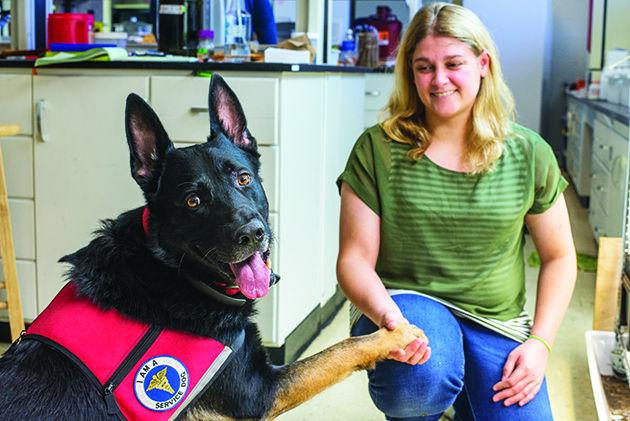Like many graduate students, Nasie Constantino deals with stress in her everyday life.
However, Constantino does more than suffer through stress — she studies it. A plant pathology doctoral student, Constantino studies biological plant stress signals.
She is also diabetic and her service dog, Axel, senses her biological distress signals when her blood sugar is off — and helps her research in the process.
Constantino said her research mainly deals with green leafy volatiles, also known as GLVs, and the ways a plant responds to a pathogen attack.
“If you go out and smell freshly cut grass, that’s what I am working with,” Constantino said. “When plants are chewed on by insects, the plant will produce a volatile response that signals to other plants to start defending themselves against insects as well as attract predators of insects to come and kill them.”
Constantino said Axel assists in her research by identifying stress signals released by both her and her plants.
“A ketone is a stress signal for me that even humans can smell. If your blood sugar is too high, you’ll smell like fruit,” Constantino said. “He can smell it way before a human can, so just like my plants, something is wrong with me and he picks it up. With my plants, something’s wrong with them [when] insects are chewing them so they emit a stress signal and a predator of the insect will come and help them.”
After almost going into diabetic shock in a cornfield one day when her low blood sugar almost kept her from making it to her car, Constantino decided to look into getting a service dog. The result was partnering with Axel.
Constantino said she has been an insulin-dependent diabetic for 18 years and has gotten so used to her blood sugar highs and lows, she can no longer feel them.
“What [Axel] does is he’ll smell ketones, which are emitted through a diabetic’s breath,” Constantino said. “The higher the blood sugar the more ketones you’ll have so he’ll sense any increases. He’s really interesting because he can actually smell the lack of ketones as well because he’s with me constantly and knows what I’m supposed to smell like.”
While Axel is specialized to assist Constantino in monitoring her blood sugar, he also helps the rest of her research team relieve stress, said Michael Kolomiets, associate professor of molecular biology of plant defense responses .
“We smell grass to determine if it is a GLV or a homozygous mutant,” Kolomiets said. “[Axel] would do a much better job because his nose receptors are much more sensitive to differences in GLVs.”
However, Axel’s main role is limited to identifying ketones in Constantino’s breath, Kolomiets said. Whether he is in the lab or not, Constantino said Axel is always busy tracking her.
“Since I’ve had it for so long, I don’t wake up when my blood sugar is low,” Constantino said. “Axel has been trained to wake me up at night. He learned a fancy new trick where he puts his back to mine, puts all four feet onto the wall and pushes until I fall out of the bed. It is effective, but not the most pleasant way to wake up.”
Dr. Alice Blue-McLendon, clinical assistant professor in the College of Veterinary Medicine and faculty advisor for Aggie Guide and Service Dogs, said service dogs like Axel are trained extensively to be aware of how to best serve their companions’ needs.
“Diabetic service dogs are trained using saliva samples from someone who has diabetes,” Blue-McLendon said. “This trains a dog to the scent of when a person’s blood sugar is abnormal. Aggie Guide and Service Dogs currently has a dog in training to become a diabetic service dog. It is in Arizona, and upon completion of training, will have a role similar to that of Nasie’s.”
A nose for distress
October 14, 2014
Tanner Garza — THE BATTALION
Plant pathology doctoral student Nasie Constantino has trained her guide dog Axel to nudge or “shake” with her when he smells ketones through her breath, letting her know her blood sugar level has deviated from normal.
0
Donate to The Battalion
$1815
$5000
Contributed
Our Goal
Your donation will support the student journalists of Texas A&M University - College Station. Your contribution will allow us to purchase equipment and cover our annual website hosting costs, in addition to paying freelance staffers for their work, travel costs for coverage and more!
More to Discover










